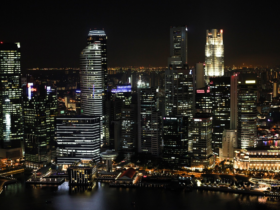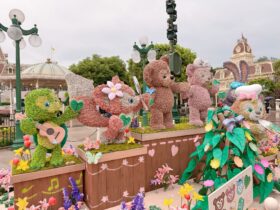Far from the iconic beaches of Thailand, Chiang Mai adds a different dimension to the Thai experience
In Thailand there are only three temperatures – hot, hotter and hottest – as our tour guide loves to remind us. Nonetheless, located in the northernmost mountainous area of Thailand, Chiang Mai is cooler than the other tourist spots.
I travelled to the region and found other interesting differences.

Chiang Mai’s Independent Origins
Over 200 years ago, Chiang Mai was a separate kingdom. It was populated by the Lannas, who had their own language, known as Kham Muag, and distinct culture. They were always under threat from neighbouring Burma, and the Mongols who invaded southern China and the area of what is now northern Thailand.
In 1556, Burma colonised Chiang Mai for the next 200 years. Through a series of political intrigues and battles, the people of Lanna finally overthrew the Burmese and joined Siam (the old name of Thailand).
In Honour of Kings

In a national park nearby, at the top of a mountain, there sits a very modest stupa with the remains of King Inthawichayanon, one of the last kings of the Lanna people.
This is no ordinary park, for it has Thailand’s tallest mountain, at 2,565m. Formerly known as Doi Luang, it was posthumously renamed Doi Inthanon, in the King’s honour. Though the Lanna monarchy ended in 1939, the mountain remains a proud reminder of Lanna heritage.
Hot air balloon rides are a rarity in South-east Asia. However, you can experience it in Chiang Mai.
A key attraction in Chiang Mai, for locals as well as tourists, Doi Inthanon National Park’s cool, dry climate is a reprieve from the dry and dusty city below. At this altitude, the cooler climate coaxes the Sakura trees within the park to blossom each spring, peppering the clear blue sky with pink petals while shepherds, on scooters, herd flocks of sheep across the meadows. Who would have thought that Thailand had Sakura and sheep!
On the main road leading to the summit, there is another attraction – Twin Pagodas, which loom above the surrounding hillsides. The two grandiose pagodas, built in honour of the reigning King Bhumibol and the Queen, serve as a reminder of Thailand’s beloved King and its primary religion – Buddhism.
It’s worth a stop to experience the panoramic mountain range and the beautiful gardens surrounding the pagodas.

Khantoke Cultural Experience
Most of us have experienced traditional Thai food – plenty of seafood spiced with lemongrass and chilli, served with fragrant fluffy Hom Mali rice. Well, Lanna is different. The sea is nowhere nearby, its dishes aren’t very spicy, and they prefer glutinous rice.
In terms of cuisine, one of the must-dos in Chiang Mai is to experience Khantoke dining. Apparently, the most popular place to do this is at Khum Khantoke, a cultural theme park of sorts, offering traditional dining and dancing amidst the ambience of Lanna architecture. (khumkhantoke.com)
In a massive U-shaped courtyard, guests, sitting on matted floor, are served traditional Lanna fare on a “khantoke”, a pedestaled circular food tray, containing smaller bowls of dishes such as pork rinds, fried chicken, boiled vegetables and noodles. Singaporeans who’ve flown SilkAir and enjoyed its on-board dining may find the khantoke food doesn’t taste as “rich” by comparison but the cultural experience certainly is richer.
During dinner, traditionally dressed dancers and drummers perform Lanna cultural performances, giving guests a taste of Lanna culture. It’s certainly worth the experience.


Stupendous Stupa

One of Chiang Mai’s iconic temples is Wat Phra That Doi Suthep located on scared grounds, which houses a relic of Buddha.
Built on the top of the hill overlooking the town, its main architectural feature is the massive, wholly gold-gilded stupa. Glittering and glowing, tourists encircle this photogenic structure, taking selfies with one of the many gilded statues of Buddha around its perimeter, while monks chant and pray nearby.
Wallet Exercise at Night Bazaar
The Night Bazaar, on Thanon Chang Khlan, is probably the only night action in Chiang Mai. It stretches several city blocks and attracts tourists with T-shirts, tribal jewellery, souvenirs, incense, carved soap bars and eateries serving a variety of cuisines. Before what my tour guide calls the “wallet exercise”, make sure you haggle.
For the more curious traveller, check out the massive Warorot Market, located 2 minutes by foot from the Bazaar. From dried insects to curry noodles, you can find what the locals buy, eat and drink.
Exhilarating Adventures
Detouring from the traditional tourist attractions, Chiang Mai also offers many adventures. Making full use of its hilly terrain, Chiang Mai offers many extreme zip-lining experiences. One of them, called Flying Squirrels
, has a zip-line course with over 30 zip-line segments which takes several hours to complete. (treetopflight.com)
The course begins at the top of hill, and zigzags across the valley, punctuated by several platforms. In one of the stops, the platform was built 40m above the valley. It’s an adrenaline-rush to zip across the ravine, avoiding branches and tops of shorter trees.

For tidy sum, you can experience a rarity in Southeast Asia – a hot air balloon ride.
For tidy sum, you can experience a rarity in Southeast Asia – a hot air balloon ride. You ascend for the hour-long ride at sunrise, cruise over the paddy fields, over pigs and horses, and land gently on one of the paddy fields below. (balloonadventurethailand.com)

If you’re looking for a different Thai experience, Chiang Mai should be your next destination.
By Frank Young

Weekender would like to thank SilkAir for flying us to Chiang Mai in the comfort of Business Class, and the Tourism Authority of Thailand for its kind hospitality.
For more information about SilkAir’s flights to Chiang Mai, please visit www.silkair.com.
ADVERTISEMENTS










Leave a Reply